The United States Government on Wednesday extended the closure of the land borders with Canada and Mexico to non-essential travelers until at least Aug. 21.
The announcement by the Department of Homeland Security came two days after the Canadian government announced it would begin letting fully vaccinated U.S. citizens into Canada on Aug. 9, and those from the rest of the world on Sept. 7.
It’s unclear how, or if, the U.S. decision will affect the Canadian decision.
People in both the U.S. and Canada have been pushing for the reopening of the border to resume the flow of visitors and tourist dollars between the two countries.
The U.S. announcement notes that increasing vaccination levels in the United States and Canada have increased and the U.S. Centers for Disease Control and Prevention lowered the COVID-19 risk level in the two countries from “very high” to “high.”‘
“Given the outbreak and continued transmission and spread of COVID-19 within the United States and globally, the Secretary (of Homeland Security Alejandro Mayorkas) has determined that the risk of continued transmission and spread of the virus associated with COVID-19 between the United States and Canada poses an ongoing ‘specific threat to human life or national interests,'” the announcement said.
New Hampshire Gov. Chris Sununu, a Republican, on Wednesday called the U.S. decision to extend the border closure “absurd.”
“It harms our small businesses and families, and does not follow the science,” he said in a statement. “Canada has announced they will open their borders to fully vaccinated Americans, and it’s time the United States follows suit.”
At the beginning of the pandemic in March 2020 both the U.S. and Canadian governments restricted non-essential travel by land between the two countries on the more than 5,500-mile (8,800-kilometer) border, although Canadians have been able to fly into the United States with a negative COVID-19 test. Until the Canadian decision on Monday, the two governments extended the closure every month.
Homeland Security posted a separate announcement Monday restricting entry on the Mexican border. On the southern border U.S. citizens and legal permanent residents have been going back and forth with ease.
Cross-border trade between the United States and Canada has not been affected by the closure.
The U.S. Travel Association estimates that each month the border is closed costs $1.5 billion. Canadian officials say Canada had about 22 million foreign visitors in 2019 — about 15 million of them from the United States.
